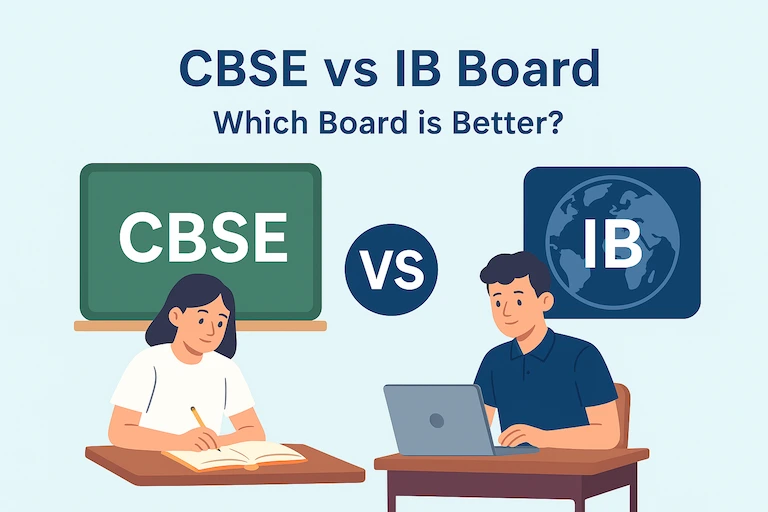
Choosing the right educational board is one of the most critical decisions parents and students face in India. With globalization shaping modern learning, both CBSE (Central Board of Secondary Education) and IB (International Baccalaureate) have emerged as dominant options. While CBSE is widely recognized across India, IB is celebrated internationally for its holistic learning style.
As academic and career goals diversify, the “CBSE vs IB Board” debate becomes more relevant than ever. Let’s break down both systems to help you make an informed choice for your child’s future.
The Central Board of Secondary Education (CBSE) is India’s most popular educational board, managed by the Government of India. It emphasizes structured learning, strong academic foundations, and standardized assessments.
CBSE focuses on science, mathematics, and languages, making it ideal for students aiming for engineering, medicine, or government exams. The curriculum emphasizes theoretical learning, supplemented by practicals and assignments.
It follows a uniform structure across the country, ensuring consistency for students who move between cities.
While CBSE is primarily Indian, it has global acceptance, especially in countries like Singapore, UAE, and Nepal. CBSE students perform well in competitive exams like JEE, NEET, and UPSC due to the board’s emphasis on core subjects.
The International Baccalaureate (IB), founded in Geneva, Switzerland, offers globally recognized programs designed to develop critical thinking, creativity, and intercultural understanding.
Unlike CBSE, IB focuses on conceptual learning, encouraging students to explore and inquire rather than memorize. Students engage in projects, essays, and real-world case studies, which enhance analytical and research skills.
IB students are well-prepared for universities abroad, as the curriculum aligns with global education standards. Many graduates secure admissions in top universities in the US, UK, and Europe.
| Feature | CBSE | IB |
|---|---|---|
| Curriculum Focus | Knowledge-based, exam-oriented | Inquiry-based, application-focused |
| Assessment Style | Summative (Board exams) | Continuous evaluation (projects, presentations) |
| Difficulty Level | Moderate | Challenging and analytical |
| Global Recognition | Moderate | Very High |
| Cost | Affordable | Expensive |
| Best Suited For | Students preparing for Indian competitive exams | Students aiming for international education |
If your child aims to pursue engineering, medicine, or government services in India, CBSE provides a more relevant foundation. The syllabus aligns closely with JEE and NEET patterns.
IB students, however, develop analytical and critical thinking skills, which can benefit in SAT, ACT, or international entrance exams.
For those targeting foreign universities, the IB board offers a clear edge. Its curriculum is recognized by over 150 countries, and IB graduates are often preferred for their independent research and problem-solving abilities.
Still, many top Indian universities also accept CBSE grades, making it a solid option domestically.
Parents often prefer CBSE for its affordability and structured approach, while students attracted to creative and exploratory learning may find IB more fulfilling.
According to an analysis on EdupowerPro, IB education promotes “global citizenship,” preparing students to thrive in diverse environments.
Education experts at EdupowerPro suggest choosing the board that best aligns with a child’s learning pace, adaptability, and long-term goals.
They emphasize that “no single board is universally superior — the right choice depends on the learner.”
1. Which board is harder, CBSE or IB?
IB is considered more challenging due to its project-based and analytical approach, while CBSE focuses more on exams and structured content.
2. Is IB accepted in India?
Yes, IB is recognized by most Indian universities and international institutions.
3. Does CBSE prepare better for Indian competitive exams?
Absolutely. CBSE’s syllabus is designed around the frameworks of JEE and NEET.
4. Is IB worth the higher fees?
For families planning for international higher education, IB’s exposure and critical thinking approach make it worth the investment.
5. Can a student switch from CBSE to IB?
Yes, though it may require an adjustment period due to curriculum differences.
6. Which board helps with overall personality development?
IB’s experiential and inquiry-based learning promotes better personality and leadership development.
Both CBSE and IB have their strengths. If your focus is on structured academics and competitive exams, CBSE is a great choice. For a global perspective and research-oriented learning, IB stands out.
Ultimately, the best decision depends on your child’s career aspirations, learning style, and family priorities. For expert insights and personalized guidance, explore EdupowerPro.com — your trusted partner in educational success.
Comments (0)
Leave a Comment